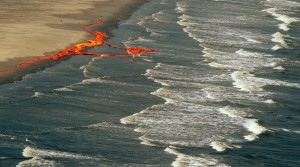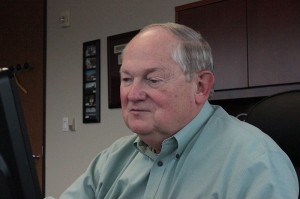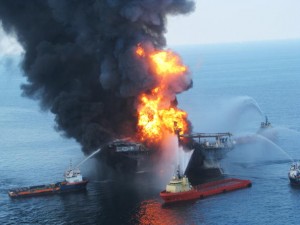What Could Reduce The Risk Of Another Catastrophic Oil Well Blowout?
A little before 10 o’clock on the night of April 20th, 2010 multiple explosions blew apart the Deepwater Horizon drilling rig. Eleven crew members died, 17 more were injured while nearly 100 others narrowly escaped. In the five years since, the drilling industry says it has dramatically changed how it does business to make it safer.
Charlie Williams, who spent 40 years at Shell where he was Chief Scientist of Well Engineering, is the man the industry has put in charge of what it calls the Center for Offshore Safety, created after the tragedy and based in Houston.
“I think we are better and we’re going to get continuously better. And the thing people have to realize is you never have zero risk. It can never be zero,” Williams told News 88.7.
But what is the risk now? One industry that is all about assessing risk is the insurance business. We came across a report done last year by a Paris-based underwriter called SCOR. It concluded: “In all honesty, it is still difficult to know if there have been effective advances in offshore safety since the … accident…”
“I used to be a drilling engineer, so I used to work seven years offshore,” Caroline Haquet wrote the report and spoke to us from Paris. Haquet said overall, she believes the drilling industry did learn from the accident and has made significant changes.
“The biggest improvement I think is that operators now know how to respond in a faster and more efficient way,” Haquet said.
She’s talking about how the drilling operators — big companies including BP, the majority owner of the well that blew out — have spent hundreds of millions of dollars on emergency equipment.The equipment is now staged along the Gulf Coast, ready to respond to a blow-out, contain the oil, and stop the flow. No such measures existed before the accident.
And that’s a big change says the industry’s Charlie Williams.
“This has all been tested, ready to go, maintained and staffed. So that is a fundamental difference and an important difference,” said Williams.
But the industry says it’s also doing far more now to prevent such a catastrophe from ever happening in the first place. That’s important because a scathing report by a presidential commission that investigated the blowout found that some contractors working on the Deepwater Horizon feared they’d be punished if they spoke out about un-safe conditions.
What’s more, when investigators reviewed data from the drilling rig’s computers, they were startled by some of the numbers. The data indicated the well was seriously malfunctioning long before it exploded.

Photo by AFP/Getty Images
Oil boom barriers that were expected to stop the spread of oil lie washed up on the beach after heavy swells and winds hit the coast of Louisiana on April 30, 2010.
But for whatever reason, the crew on board continued with the drilling operation. That’s why some in the industry believe there is a way to prevent a similar catastrophe.
It’s called real time monitoring. Using a system that steals ideas from NASA’s mission control, it allows drilling experts back at company headquarters to watch what a drilling crew is doing off shore and intervene if something doesn’t look right.
One advisor to that presidential commission, Richard Sears, told News 88.7 it could have made all the difference. But in April of 2010, he said only one big oil company was using real time monitoring and it wasn’t BP.
Now, several big drillers including BP have built real time monitoring centers in Houston. BP wouldn’t talk to us on the record for this story but the company touts their center in a YouTube video.
The monitoring centers are the reason that big oil companies, government regulators, and scientists are meeting for a two day workshop this week in Houston. They’ll talk about how to expand the use of the monitoring and how that might reduce the risk of what happened in the Gulf five years ago from happening again.

